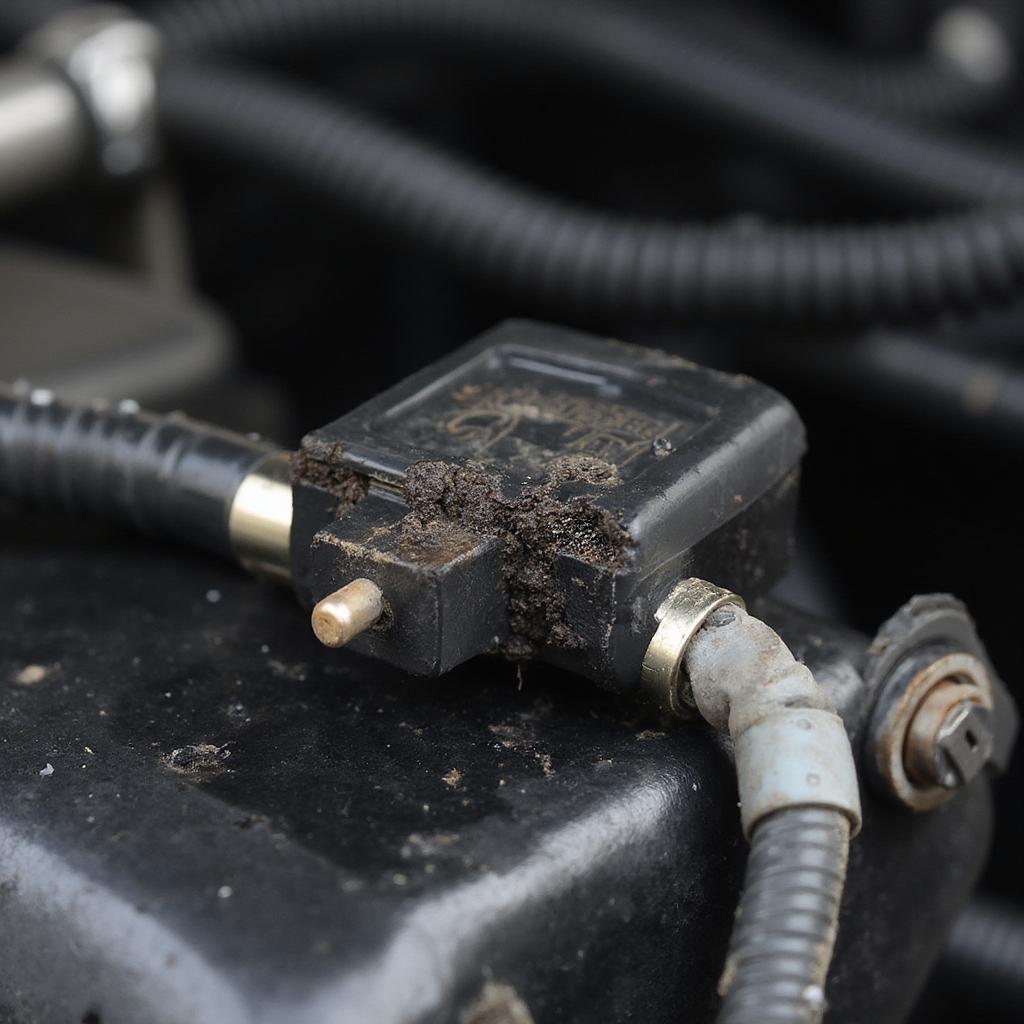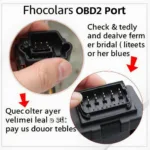P0171 is a common OBD2 trouble code that indicates a lean air-fuel mixture in engine bank 1. This means there’s too much air or not enough fuel entering your engine’s cylinders. Ignoring this code can lead to decreased fuel economy, performance issues, and potentially damage your engine. Understanding this code is crucial for effective troubleshooting and repairs.
Getting a P0171 diagnostic trouble code can be concerning. What does it signify for your vehicle’s health and performance? This comprehensive guide breaks down everything you need to know about the P0171 code, from its meaning and causes to diagnostic procedures and solutions. We’ll equip you with the knowledge to tackle this issue effectively and get your car back on the road. You might find resources like understanding OBD2 codes helpful for a general overview.
Decoding the P0171 OBD2 Code
The P0171 code specifically refers to “System Too Lean (Bank 1).” In simpler terms, it signals an imbalance in the air-fuel mixture entering your engine’s cylinders, specifically on Bank 1. In most vehicles, Bank 1 refers to the side of the engine containing cylinder number one. This imbalance means there’s an excess of air compared to the amount of fuel.
If you’re dealing with a Suzuki, you can check out our obd2 suzuki grand vitara 2007 guide for model-specific information.
This lean condition can stem from several issues ranging from simple vacuum leaks to more complex sensor malfunctions. Understanding these potential culprits is crucial for accurate diagnosis and repair.
What Causes a P0171 Code?
Several factors can trigger the P0171 code. Some common culprits include:
- Vacuum Leaks: A leak in the intake system allows unmetered air to enter the engine, disrupting the air-fuel ratio.
- Faulty Mass Air Flow (MAF) Sensor: The MAF sensor measures the amount of air entering the engine. A malfunctioning sensor can send incorrect data to the engine control unit (ECU), leading to a lean mixture.
- Malfunctioning Oxygen Sensor (O2 Sensor): The O2 sensor monitors the exhaust gases to determine the air-fuel ratio. A faulty sensor can provide inaccurate readings, causing the ECU to miscalculate the fuel injection.
- Fuel Pressure Issues: Low fuel pressure, caused by a weak fuel pump or clogged fuel filter, can restrict fuel delivery, resulting in a lean mixture.
- Fuel Injector Problems: A clogged or leaking fuel injector can disrupt the precise fuel delivery needed for optimal combustion.
“Ignoring a P0171 code can be detrimental to your engine’s health in the long run,” says automotive expert John Miller, a seasoned mechanic with over 20 years of experience. “Addressing the underlying issue promptly can save you from costly repairs down the line.”
Diagnosing the P0171 Code
Diagnosing the root cause of the P0171 code requires a systematic approach:
- Check for Vacuum Leaks: Inspect all vacuum hoses and connections for cracks, loose fittings, or damage.
- Inspect the MAF Sensor: Check for dirt or debris on the sensor. Clean it with a specialized MAF sensor cleaner.
- Test the O2 Sensor: Use an OBD2 scanner to monitor the O2 sensor readings. Inconsistent or out-of-range values indicate a potential problem.
- Check Fuel Pressure: Use a fuel pressure gauge to measure the fuel pressure. Low pressure can indicate a faulty fuel pump or clogged fuel filter.
- Inspect Fuel Injectors: Check for leaks or clogs in the fuel injectors.
If you’re looking for OBD2 solutions for your Infiniti, our fx35 obd2 page may offer relevant insights.
“A systematic diagnostic approach is key to pinpointing the exact cause of the P0171 code,” advises automotive specialist Sarah Johnson, an experienced diagnostic technician known for her expertise in engine management systems. “Don’t just throw parts at the problem. A thorough inspection can save you time and money.”
Fixing the P0171 Code
Once you’ve identified the cause, you can take the necessary steps to fix it. This might involve:
- Repairing Vacuum Leaks: Replace damaged or cracked vacuum hoses and tighten loose connections.
- Replacing the MAF Sensor: If the MAF sensor is faulty, replace it with a new one.
- Replacing the O2 Sensor: A faulty O2 sensor should be replaced to ensure accurate readings.
- Addressing Fuel Pressure Issues: Replace a weak fuel pump or clogged fuel filter to restore proper fuel pressure.
- Cleaning or Replacing Fuel Injectors: Clean clogged injectors or replace faulty ones to ensure proper fuel delivery.
Conclusion: Tackling the P0171 Code with Confidence
The P0171 OBD2 code, signaling a lean air-fuel mixture, can be a significant concern for your vehicle’s health. By understanding its meaning, potential causes, and diagnostic steps, you can address this issue effectively. Armed with this knowledge and a systematic approach, you can ensure your vehicle runs smoothly and efficiently, avoiding potentially costly repairs down the line. Don’t forget to check out resources like bmw obd2 apk or obd2 codes for 1999 volvo v70 for more specific information related to your car model.
FAQ
- What does P0171 mean? It indicates a lean air-fuel mixture in engine bank 1.
- Can I drive with a P0171 code? While you might be able to drive, it’s best to address the issue promptly to avoid potential engine damage.
- Is P0171 serious? Ignoring it can lead to decreased performance and fuel economy and potentially damage your catalytic converter.
- What is a lean air-fuel mixture? It means there’s too much air and not enough fuel in the engine’s combustion chamber.
- How do I fix P0171? The fix depends on the underlying cause, ranging from repairing vacuum leaks to replacing sensors.
- What tools do I need to diagnose P0171? An OBD2 scanner, vacuum gauge, and fuel pressure gauge are helpful tools.
- Can a bad gas cap cause P0171? Yes, a faulty gas cap can create a vacuum leak, leading to a lean mixture.
For further assistance, contact us via WhatsApp: +1(641)206-8880, Email: [email protected], or visit our office at 789 Elm Street, San Francisco, CA 94102, USA. Our 24/7 customer support team is ready to help.

